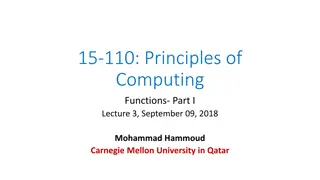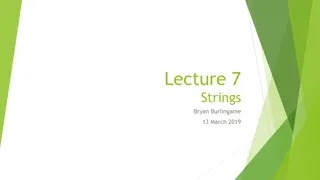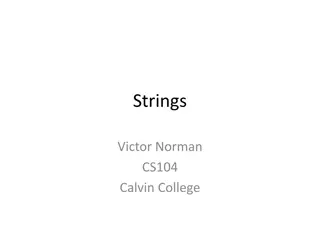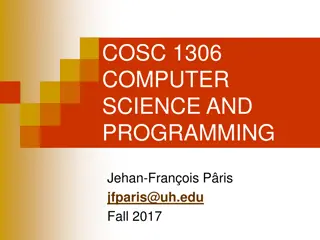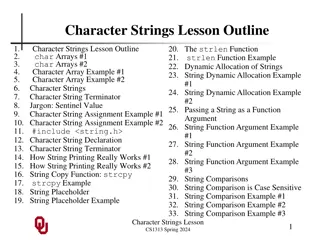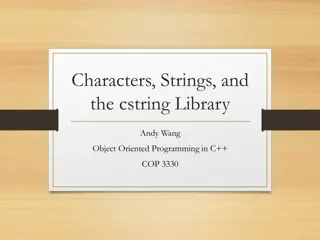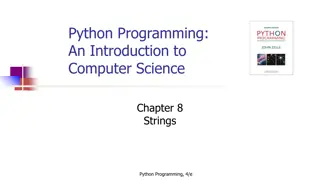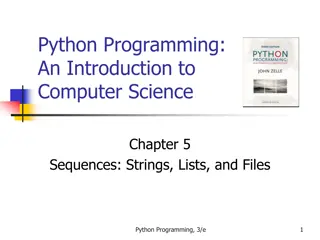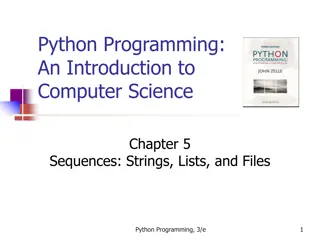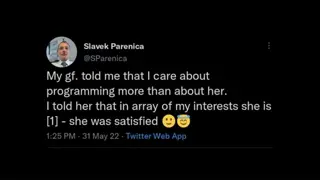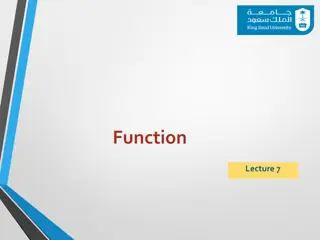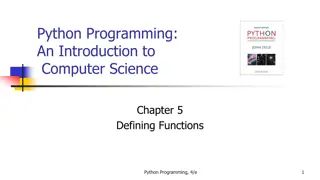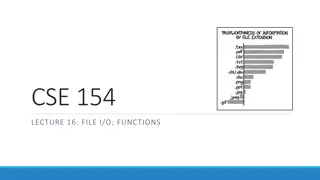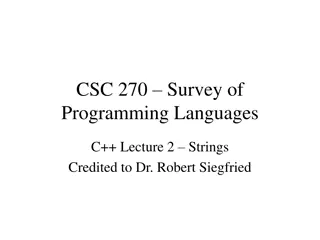Introduction to C++ Programming: Strings and Predefined Functions
This lecture covers essential concepts and functions related to strings in C++, including predefined functions in , input and output methods for C-strings, and examples demonstrating the usage of getline and get functions. Additionally, it provides insights into handling user input and checking input in C++ programs.
Uploaded on Oct 03, 2024 | 0 Views
Download Presentation

Please find below an Image/Link to download the presentation.
The content on the website is provided AS IS for your information and personal use only. It may not be sold, licensed, or shared on other websites without obtaining consent from the author. Download presentation by click this link. If you encounter any issues during the download, it is possible that the publisher has removed the file from their server.
E N D
Presentation Transcript
CSC 270 Survey of Programming Languages C++ Lecture 2 Strings Credited to Dr. Robert Siegfried
Predefined Functions in <cstring> Function strcpy(s, t) strncpy(s, t, n) Description Copies t into s Copies t into s but no more than n characters are copies Concatenates t to the end of s Concatenates t to the end of s but no more than n characters Returns the length of s (not counting \0 ) Returns 0 if s == t < 0 if s < t > 0 if s > t Same as strcmp but compares no more than n characters Caution No bounds checking Not implemented in all versions of c++ No bounds checking Not implemented in all versions of c++ strcat(s, t) strncat(s, t, n) strlen(s) strcmp(s, t) No bounds checking strncmp(s, t, n) Not implemented in all versions of c++
C-String: Input and Output In addition to cin >> and cout << , there are other input and output methods available when working with strings: getline() get() put() putback () peek() ignore()
getline() getline()allows the user to read in an entire line of text at a time, or no more than n characters: char a[80], s[5]; std::string str cout << "Enter a line:" cin.getline(a, 80); cout << "Enter a short word:"; getline(cin, str, '\n'); cout << "\'" << a << "\'\n\'" << s << "\'" << endl; In both cases, one character less is actually read in to leave room for '\0'
getline() An Example Enter a line: Do be do to you! Enter a short word Do be Do to you! Do be Do to you!Do b
get() The function get() allows the user to read in every character typed, including whitespace characters. Use: char nextChar; cin.get(nextSymbol); get() reads blanks and newlines as well as other characters: char c1, c2, c3 cin.get(c1); cin.get(c2); cin.get(c3); If you had entered AB\nCD , c3 would contain the newline.
CheckInput.cpp #include using namespace std; <iostream> void newLine(void); // Discards all the input remaining on the current // input line. // Also discards the '\n' at the end of the line. void getInt(int & number); // Sets the variable number to a // value that the user approves of
int main(void) { int n; getInt(n); cout << "Final value read in == " << n << "\n" << "End of demonstation." << endl; return(0); }
// Uses iostream: void newLine(void) { char symbol; do { cin .get(symbol); } while (symbol != '\n'); } OR cin.ignore() but flushes entire buffer.
//Uses iostream void getInt(int &number) { char ans; do { cout << "Enter input number: "; cin >> number; cout << "You entered " << number << " Is that correct(yes/no): "; cin >> ans; newLine(); } while ((ans == 'N') || (ans == 'n')); }
put() put() allows the program to print a single character. It does not do anything that cannot be done using <<. Example cout.put('a');
putback () Sometimes your program needs to know what the next character in the input stream is going to be, but it may not be needed here. Therefore your program needs to be able to put back that next character. putback() allows your program to return a character to the input stream.
if ( (c >= '0') && (c <= '9') ) { cin.putback (c); cin >> n; cout << "You have entered number " << n << endl; } else { cin.putback (c); cin >> str; cout << " You have entered word " << str << endl; } return 0; }
peek() peek() returns the next character in the input stream without actually removing it from the input steam it allows you a peek at what comes next.
peek() An Example // istream peek #include <iostream> using namespace std; int main () { char c; int n; char str[256]; cout << "Enter a number or a word: "; c=cin.peek();
if ( (c >= '0') && (c <= '9') ) { cin >> n; cout << "You have entered number " << n << endl; } else { cin >> str; cout << " You have entered word " << str << endl; } return 0; }
ignore() ignore() skips up to n characters, or until it encounters a particular character of the programmer s choosing, which ever comes first.
ignore() An Example // istream ignore #include <iostream> using namespace std; int main () { char first, last; cout << "Enter your first and last names: "; first=cin.get(); cin.ignore(256,' ');
last=cin.get(); cout << "Your initials are " << first << last; return 0; }
Character-manipulating Functions There are several operations that you may need for basic text manipulation and are most commonly performed character by character. These functions have their prototypes in the cctype header file. Using these methods requires that #include <cctype> be included in the program using them
Functions in <cctype> Function toupper(c) Description Returns the upper case version of the character Returns the lower case version of the character Returns true if c is an upper case letter Returns true if c is an lower case letter Returns true if c is a letter Example c = toupper( a ); tolower(c) c = tolower( A ); isupper(c) if (isupper(c)) cout << upper case ; islower(c) if (islower(c)) cout << lower case ; isalpha(c) if (isalpha(c)) cout << it s a letter ; isdigit(c) if (isalpha(c)) cout << it s a number ; Returns true if c is a digit (0 through 9)
Functions in <cctype> (continued) Function isalnum(c) Description Returns true if c is alphanumeric Returns true if c is a white space character Returns true if c is a printable character other than number, letter or white space Returns true if c is a printable character Returns true if c is a printable character other an white space Example if (isalnum( 3 )) cout << alphanumeric ; isspace(c) while (isspace(c)) cin.get(c); ispunct(c) if (ispunct(c)) cout << punctuation ; isprint(c) isgraph(c) isctrl(c) Returns true if c is a control character
Pitfall: toupper and tolower return int value In many ways, C and C++ consider characters to be 8-bit unsigned integers. For this reason, many string functions return an int value. Writing cout << toupper('a'); will not write A but the numeric code that represents A . To get the desired result write char c = toupper('a'); cout << c;
The string class Up until now, we have been using C-strings, which are arrays of characters ended with a null byte. The class string is defined in the library <string> and allows you to use strings in a somewhat more natural way. You can use = as an assignment operator and + as a concatenation operator.
ants.cpp #include #include <string> using namespace std; <iostream> int { main(void) string phrase; //uninitialized // The following ARE BOTH initialized string adjective("fried"), noun("ants"); string wish = "Bon appetit";
// + is used for concatenation phrase = "I love " + adjective + " " + noun + "!"; cout << phrase << endl; cout << wish << endl; return 0; } Output I love fried ants! Bon appetit
I/O with string You can use the insertion operator >> and cout to print string objects just as you would do with any other data item. You can use the extraction operator << and cin to read string objects, but << will skip initial whitespace and then read only until the next whitespace character. If you wish to read input including the whitespace, you need to use the method cin.get()
motto.cpp // Demonstrates getline and cin.get #include <iostream> #include <string> using namespace std; void newLine(); int { main(void) string firstName, lastName, recordName; string motto = "Your records are our records.";
cout << "Enter your first and last name:"; cin >> firstName >> lastName; newLine(); recordName = lastName + ", " + firstName; cout << "Your name in our records is: "; cout << recordName << endl; cout << "Our motto is\n" << motto << endl; cout << "Please suggest a better " << "(one line) motto:\n";
getline(cin, motto); cout << "Our new motto will be:\n"; cout << motto << endl; return(0); } // Uses iostream void newLine(void) { char nextChar; do { cin.get(nextChar); } while (nextChar != '\n'); }
more Versions of getline getline(cin, line); will read until the newline character. getline(cin, line, '?'); will read until the '?'. getline(cin, s1) >> s2; will read a line of characters into s1 and then store the next string (up to the next whitespace) in s2.
Mixing cin << variable with getline Consider int n; string line; cin >> n; getline(cin, line); will read a value into n but nothing in line because it is holding the remainder of the line from which n s value comes for the next use of cin.
String Processing with string The string class lets you use the same operations that C-string allow and then some. E.g. string s1; s1.length - returns the length of the string s1. 1astName[i] is the ith character in the string.
NameArray.cpp // Demonstrates using a string object as if it were // an array #include <iostream> #include <string> using namespace std; int { main(void) string firstName, lastName; cout << "Enter your first and last name:\n"; cin >> firstName >> lastName;
cout << "Your last name is spelled:\n"; unsigned i; for (i = 0; i < lastName.length(); i++) { cout << lastName[i] << " "; lastName[i] = '-'; } cout << endl; for (i = 0; i < lastName.length(); i++) // Places a "-" under each letter cout << lastName[i] << " "; cout << endl;
cout << "Good day, " << firstName << endl; return(0); } Output Enter your first and last name: Robert Siegfried Your last name is spelled: S i e g f r i e d - - - - - - - - - Good day, Robert
Member Functions of the string class Example Constructors Remarks Default constructor creates empty string object str Creates a string object with data "string" Creates a string object that is a copy of aString, (which is a string object) string str string str("string"); string str(aString); Element Access str[i] Returns read/write reference to character in str at index i Returns read/write reference to character in str at index i Return the substring of the calling object starting at position and having length characters str.at(i) str.substr(position, length)
Member Functions of the string class Example Assignment/Modifiers Remarks Allocates space and initializes it to str1 s data, releases memory allocated to str1 and sets str1's size to that of str2. Character data of str2 is concatenated to the end of str1; the size is set appropriately Returns true if str is an empty string; returns false otherwise Returns a string that has str2 s data concatenated to the end of str1 s data. The size is set appropriately Inserts str2 into str beginning at position pos Removes a substring of size length beginning at position pos string str1 = str2; str1 += str2; str.empty(); str1 + str2 str.insert(pos, str2) str.remove(pos, length)
Member Functions of the string class Example Comparisons Remarks str1 == str2 str1 != str2; Compare for equality or inequality; returns a Boolean value. str1 < str2 str1 > str2 str1 >= str2 Four comparisons. All are lexicographical comparisons Returns index of the first occurrence of str1 in str. Returns index of the first occurrence of str1 in str; the search starts at position pos. Returns index of the first instance of any character in str1; the search starts at position pos. Returns index of the first instance of any character not in str1; the search starts at position pos str1 <= str2; str.find(str1) str.find(str1, pos) str.find_first_of(str1, pos) str.find_first_not_of(pos, length)
palindrome.cpp // Test for palindrome property #include <iostream> #include <string> #include <cctype> using namespace std; // Interchanges the values of v1 and v2 void swap(char &v1, char &v2); // Returns a copy of s but with characters in // reverse order string reverse(const string &s);
// Returns a copy of s with any occurrences of // characters in the string punct removed. string removePunct(const string &s, const string &punct); // Returns a copy of s that has all uppercase // characters changed to lowercase, with other // characters unchanged string makeLower(const string &s); // Returns true if s is a palindrome; // false otherwise bool isPal(const string &s);
int main(void) { string str; cout << "Enter a candidate for palindrome " << "test followed by press Return." << endl; getline(cin, str); if (isPal(str)) cout << "\"" << str + "\" is a palindrome." << endl; else cout << "\"" << str + "\" is not a palindrome." << endl;
cin >> str; return(0); } void swap(char &v1, char &v2) { char temp = v1; v1 = v2; v2 = temp; }
string reverse(const string &s) { int start = 0; int end = s.length(); string temp(s); while (start < end) { --end; swap(temp[start], temp[end]); start++; } return temp; }
// Uses <cctype> and <string> string makeLower(const string &s) { string temp(s); for (int i = 0; i < s.length(); i++) temp[i] = tolower(s[i]); return temp; }
string removePunct(const string &s, const string &punct) { string noPunct; //Initialized to empty string int sLength = s.length(); int punctLength = punct.length(); for (int i = 0; i < sLength; i++) { // A one-character string string aChar = s.substr(i, 1); // Find location of successive // characters of achar in punct int location = punct.find(aChar, 0);
// aChar is not in punct, so keep it if (location < 0 || location >= punctLength) noPunct = noPunct + aChar; } return noPunct; }
// Uses functions makeLower, removePunct bool isPal(const string &s) { string punct(",;:.?!'\" "); // includes a blank string str(s); str = makeLower(str); string lowerStr = removePunct(str, punct); return (lowerStr == reverse(lowerStr)); }
Converting string objects and C- Strings //Legal char aCString[] = This is my C-string. ; string stringVariable; stringVariable = aCString; //ILLEGAL aCString = stringVariable; Strcpy(ACString, stringVariable); //Legal Strcpy(aCString, stringVariable.c_str()); //ILLEGAL aCString = stringVAriable.c_str();







